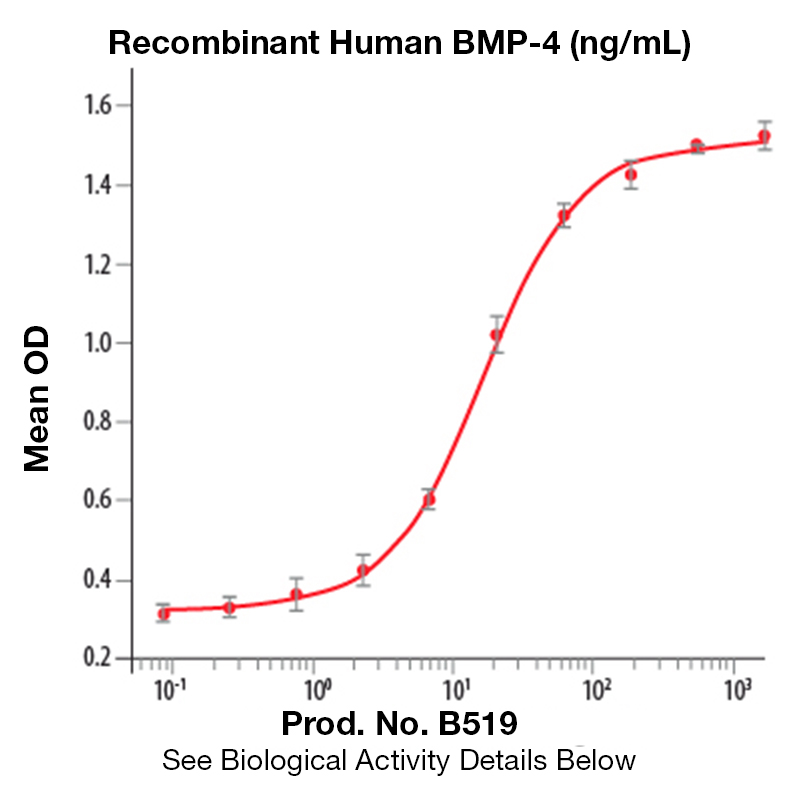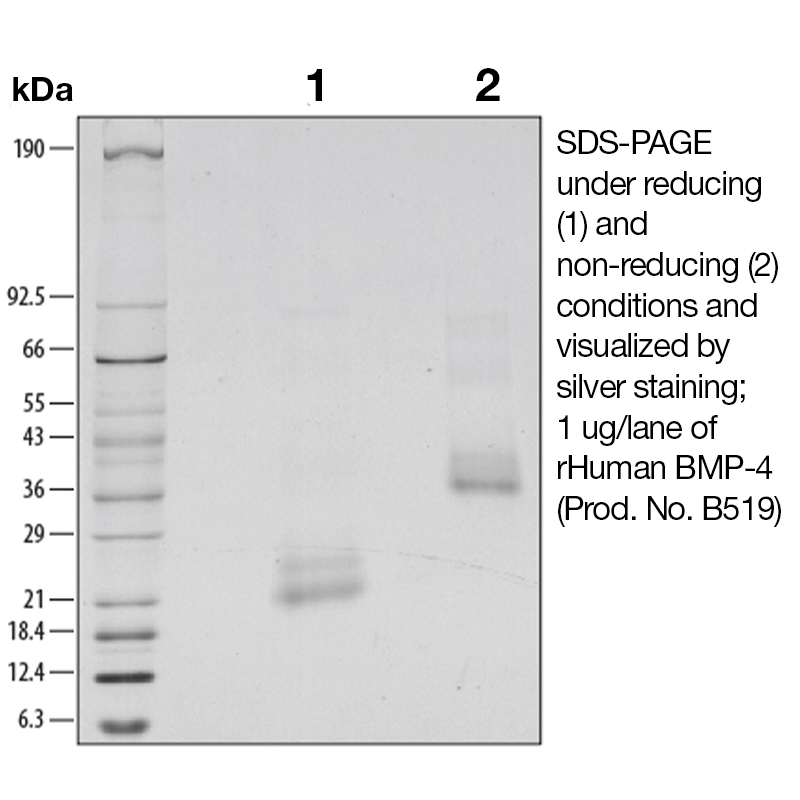Recombinant Human BMP-4
Data
- -
- -
BackgroundBone morphogenetic protein 4 (BMP4) belongs to the TGF-β superfamily of proteins. Like other bone morphogenetic proteins, it is involved in bone and cartilage development. It is mainly involved in tooth and limb development, fracture repair, muscle development, bone mineralization, and uteric bud development. BMP4 has also been implicated in Fibrodysplasia Ossificans Progressiva in which it is underexpressed. In human embryonic development, BMP4 is a critical signaling molecule required for the early differentiation of the embryo and establishing of a dorsal-ventral axis. BMP4 is secreted from the dorsal portion of the notochord, and it acts in concert with sonic hedgehog (released from the ventral portion of the notochord) to establish a dorsal-ventral axis for the differentiation of later structures. BMP4 stimulates differentiation of overlying ectodermal tissue. Inhibition of the BMP4 signal (by chordin, noggin, or follistatin) causes the ectoderm to differentiate into the neural plate. If these cells also receive signals from FGF, they will differentiate into the spinal cord; in the absence of FGF the cells become brain tissue. Recombinant human BMP-4, expressed in HeLa cells, is a 31-36 kDa homodimeric glycoprotein. BMP-4 and BMP-7 are each 98% conserved between human and mouse. Human BMP-4 shares 85% aa sequence identity with human BMP-2 and less than 50% aa sequence identity with other BMPs. Human BMP-7 shares approximately 60 - 70% aa sequence identity with BMP-5, -6, and -8 and less than 50% aa sequence identity with other BMPs. Protein DetailsPurity >95% by SDS-PAGE and analyzed by silver stain. Endotoxin Level <0.01EU/µg as determined by the LAL method Biological Activity The biological activity of Human BMP-4 was determined by its ability to induce alkaline phosphatase production by mouse ATDC5 chondrogenic cells. The expected ED<sub>50</sub> for this effect is 10 - 30 ng/ml. Protein Accession No. Amino Acid Sequence spkhhsqr arkknkncrr hslyvdfsdv gwndwivapp gyqafychgd cpfpladhln stnhaivqtl vnsvnssipk accvptelsa ismlyldeyd kvvlknyqem vvegcgcr N-terminal Sequence Analysis Ser293 State of Matter Lyophilized Predicted Molecular Mass Recombinant Human BMP-4 is a homodimeric protein consisting of two 116 amino acid chains. The predicted molecular weight of each monomer is Mr 13 kDa. However due to glycosylation, the actual molecular weight of the monomer as observed by migration on SDS Page under reducing conditions is Mr 22 kDa. Predicted Molecular Mass 13 Formulation This recombinant protein was lyophilized from a 0.2 μm filtered solution in 30% acetonitrile (CH3CN) and 0.1% trifluoroacetic acid (TFA). Storage and Stability This lyophilized protein is stable for six to twelve months when stored desiccated at -20°C to -70°C. After aseptic reconstitution, this protein may be stored at 2°C to 8°C for one month or at -20°C to -70°C in a manual defrost freezer. Avoid Repeated Freeze Thaw Cycles. See Product Insert for exact lot specific storage instructions. Country of Origin USA Shipping Next Day Ambient NCBI Gene Bank References & Citations1. Sato, K. et al. (2006) J Comp Neurol. 499(4):613-25. 2. Christian, JL. et al. (2006) J Biol Chem. 281(45):34021-31. 3. Gilchrest, BA. et al> (2006) J Biol Chem. 281 (35):25307-14. 4. Mowla, SJ. et al. (2006) Anat Histol Embryol. 35(4):271-8. 5. Keski-Oja, J. et al. (2006) Am J Pathol.169(1):61-71. Certificate of AnalysisIMPORTANT Use lot specific datasheet for all technical information pertaining to this recombinant protein. |




